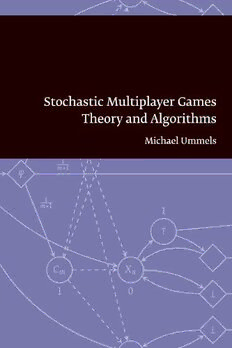Download Stochastic Multiplayer Games: Theory and Algorithms (Pallas Proefschriften) PDF Free - Full Version
Download Stochastic Multiplayer Games: Theory and Algorithms (Pallas Proefschriften) by Michael Ummels in PDF format completely FREE. No registration required, no payment needed. Get instant access to this valuable resource on PDFdrive.to!
About Stochastic Multiplayer Games: Theory and Algorithms (Pallas Proefschriften)
Stochastic games provide a versatile model for reactive systems that are affected by random events. This dissertation advances the algorithmic theory of stochastic games to incorporate multiple players, whose objectives are not necessarily conflicting. The basis of this work is a comprehensive complexity-theoretic analysis of the standard game-theoretic solution concepts in the context of stochastic games over a finite state space. One main result is that the constrained existence of a Nash equilibrium becomes undecidable in this setting. This impossibility result is accompanied by several positive results, including efficient algorithms for natural special cases.
Detailed Information
| Author: | Michael Ummels |
|---|---|
| Publication Year: | 2010 |
| ISBN: | 9789085550402 |
| Pages: | 175 |
| Language: | English |
| File Size: | 1.975 |
| Format: | |
| Price: | FREE |
Safe & Secure Download - No registration required
Why Choose PDFdrive for Your Free Stochastic Multiplayer Games: Theory and Algorithms (Pallas Proefschriften) Download?
- 100% Free: No hidden fees or subscriptions required for one book every day.
- No Registration: Immediate access is available without creating accounts for one book every day.
- Safe and Secure: Clean downloads without malware or viruses
- Multiple Formats: PDF, MOBI, Mpub,... optimized for all devices
- Educational Resource: Supporting knowledge sharing and learning
Frequently Asked Questions
Is it really free to download Stochastic Multiplayer Games: Theory and Algorithms (Pallas Proefschriften) PDF?
Yes, on https://PDFdrive.to you can download Stochastic Multiplayer Games: Theory and Algorithms (Pallas Proefschriften) by Michael Ummels completely free. We don't require any payment, subscription, or registration to access this PDF file. For 3 books every day.
How can I read Stochastic Multiplayer Games: Theory and Algorithms (Pallas Proefschriften) on my mobile device?
After downloading Stochastic Multiplayer Games: Theory and Algorithms (Pallas Proefschriften) PDF, you can open it with any PDF reader app on your phone or tablet. We recommend using Adobe Acrobat Reader, Apple Books, or Google Play Books for the best reading experience.
Is this the full version of Stochastic Multiplayer Games: Theory and Algorithms (Pallas Proefschriften)?
Yes, this is the complete PDF version of Stochastic Multiplayer Games: Theory and Algorithms (Pallas Proefschriften) by Michael Ummels. You will be able to read the entire content as in the printed version without missing any pages.
Is it legal to download Stochastic Multiplayer Games: Theory and Algorithms (Pallas Proefschriften) PDF for free?
https://PDFdrive.to provides links to free educational resources available online. We do not store any files on our servers. Please be aware of copyright laws in your country before downloading.
The materials shared are intended for research, educational, and personal use in accordance with fair use principles.

